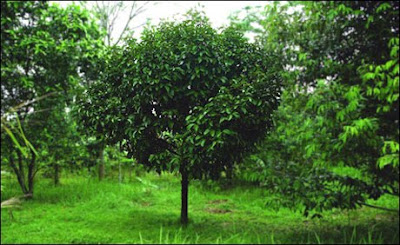
Think of the good things that nature has produced ... in the way of herbs, roots, fruits, grain, cattle, fish - all in common - ; in the way of wood and metals; of skins and wool; of the commodities that are derived from animals ... Whatever is brought forth, it has spread out in this great domicile of the world without erecting any barriers or doors, in order that they might be held in common by all who come into it. Now, tell me, you who have raised yourself up with a little or with much, are you more a child of nature than I ? If not, why do you exclude me as if you were a legitimate son of nature and I a bastard ? But you say, I used my labour and my industry. Just do not bar with me your titles to possession, and I shall do the same. Out of the evil that is in us we make our own what liberal nature intended for all ... we ... enclose it and forbid it to others; we set it off with fences, walls, locks, iron, arms, and finally with laws. And so, greed and ill will have brought hunger in the midst of the abundance of nature and poverty in the riches of God.
- Juan Luis Vives (1492-1540)
Avant que les proprietez des choses fussent distinctes, tout estoit public et commun. Et faut croire que les premiers Autheurs des loix qui ont réglé les peuples pour les faire vivre en paix ... ont réservé au public pour demeurer en sa première nature ce qui estoit nécessaire pour tous ensemble... Suivant ce, se peut dire que le seigneur d'un pré en prairie n'est pas seigneur de la pleine propriété, mais seulement pour s'en servir selon ce que la Coutume luy en a donné puissance et permission.
Bevor das Eigentum aller Dinge unterschieden wurde, war alles öffentlich und im Gemeinbesitz. Und man darf annehmen, daß die ersten Urheber der Gesetze, welche den Völkern eine Ordnung geschaffen haben, um ihnen ein friedliches Zusammenleben zu ermöglichen ... für die öffentlichen Güter (die Allmende), damit diese in ihrem ursprünglichen Zustand blieben, dasjenige reserviert haben, was alle zusammen notwendig brauchen ... Insofern kann man sagen, daß der Grundherr einer Wiese im Wiesenland diese nicht als volles Grundeigentum besitzt, sondern sich ihrer nur in dem Maße bedienen kann, als ihm das (kollektive) Gewohnheitsrecht die Vollmacht und Erlaubnis hierfür gegeben hat.
- Guy Coquille, La Coutume de Nivernais (vers 1590)
Le premier qui, ayant enclos un terrain, s’avisa de dire: Ceci est à moi, et trouva des gens assez simples pour le croire, fut le vrai fondateur de la société civile. Que de crimes, de guerres, de meurtres, que de misères et d’horreurs n’eût point épargnés au Genre humain celui qui, arrachant les pieux ou comblant le fossé, eût crié à ses semblables: Gardez-vous d’écouter cet imposteur; vous êtes perdus, si vous oubliez que les fruits sont à tous, et que la Terre n’est à personne.
Der erste, der ein Stück Land eingezäunt hatte und es sich einfallen ließ zu sagen: dies ist mein und der Leute fand, die einfältig genug waren, ihm zu glauben, war der wahre Gründer der bürgerlichen Gesellschaft. Wie viele Verbrechen, Kriege, Morde, wie viel Not und Elend und wie viele Schrecken hätte derjenige dem Menschengeschlecht erspart, der die Pfähle herausgerissen oder den Graben zugeschüttet und seinen Mitmenschen zugerufen hätte: 'Hütet euch, auf diesen Betrüger zu hören; ihr seid verloren, wenn ihr vergeßt, daß die Früchte allen gehören und die Erde niemandem'.
- Jean-Jacques Rousseau, Discours sur l'inégalité (1755)
Gardening was probably one of the first arts that succeeded to that of building houses, and naturally attended property and individual possession. Culinary, and afterwards medicinal herbs, were the objects of every head of a family: it became convenient to have them within reach, without seeking them at random in woods, in meadows, and on mountains, as often as they were wanted. When the earth ceased to furnish spontaneously all these primitive luxuries, and culture became requisite, separate enclosures for rearing herbs grew expedient. Fruits were in the same predicament, and those most in use or that demand attention, must have entered into and extended the domestic enclosure. The good man Noah, we are told, planted a vineyard, drank of the wine, and was drunken, and everybody knows the consequences. Thus we acquired kitchen-gardens, orchards, and vineyards. I am apprised that the prototype of all these sorts was the garden of Eden, but as that Paradise was a good deal larger than any we read of afterwards, being enclosed by the rivers Pison, Gihon, Hiddekel and Euphrates, as every tree that was pleasant to the sight and good for food grew in it, and as two other trees were likeweise found there, of which not a slip or sucker remains, it does not belong to the present discussion.
- Horace Walpole, On Modern Gardening (2 August 1770)
This primitive accumulation plays in Political Economy about the same part as original sin in Theology. Adam bit the apple, and thereupon sin fell on the human race. Its origin is supposed to be explained when it is told as an anecdote of the past. In times long gone by there were two sorts of people; one, the diligent, intelligent, and, above all, frugal elite; the other, lazy rascals, spending their substance, and more, in riotous living. Thus it came to pass that the former sort accumulated wealth, and the latter sort had at last nothing to sell except their own skins. And from this original sin dates the poverty of the great majority that, despite all its labour, has up to now nothing to sell but itself, and the wealth of the few that increases constantly although they have long ceased to work. Such insipid childishness is every day preached to us in the defence of property. ... as soon as the question of property crops up, it becomes a sacred duty to proclaim the intellectual food of the infant as the one thing fit for all ages and for all stages of development.
- Karl Marx, The Capital, Volume I (1867)
Printed Sources:
Juan Luis Vives: Helen Sullivan, The Communal Mind and the Master Artifice, Stochastis Editions, Athens 2010, page 177; Guy Coquille: Marc Bloch, La lutte pour l'individualisme agraire dans la France du XVIIIe siècle (1e partie), in: Annales d'Histoire économique et sociale, Volume II, 1930, page 329 ou: M.B., Mélanges historiques, Tome 2, Paris 1963, Repr. 1983, page 593 renvoyant à Guy Coquille, Coutume du Nivernais, éditée par André Dupin, 1864, page 262; J.-J. Rousseau, Diskurs über die Ungleichheit - Discours sur l'inégalité. Kritische Ausgabe des integralen Textes ... neu ediert, übersetzt und kommentiert von Heinrich Meier, UTB Schöningh, Paderborn u.a. 1984, page 172 f; Horace Walpole, On Modern Gardening, Pallas Athene Publishers, London 2004, Reprint 2010, page 11f.; das deutsche Marx-Zitat am Anfang von Kapitel 24 des ersten Bandes des "Kapital": MEW 23, Seite 741 oder Ullstein-Taschenbuch 2806, Seite 659
Photo: Englischer Garten, München, Germany







